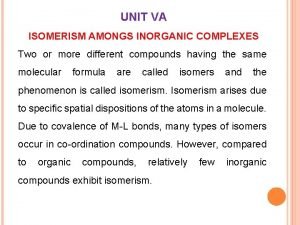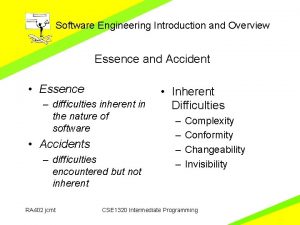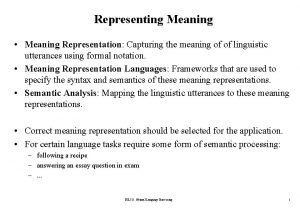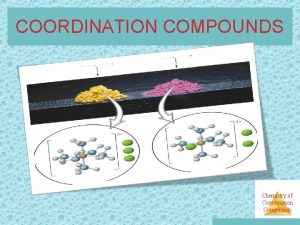COORDINATION THE ESSENCE OF MANAGEMENT MEANING OF COORDINATION














- Slides: 14

COORDINATION – THE ESSENCE OF MANAGEMENT

MEANING OF COORDINATION • Arrangement of group efforts • Unity of action • Pursuit of common objectives

DEFINITION OF COORDINATION • Haimann , “ coordination is the orderly synchronizing of efforts of the subordinates to provide the proper amount, timing and quality of execution so that their unified efforts lead to the stated objective, namely, the common purpose of the enterprise”.

RELATIONSHIP BETWEEN MANAGERIAL FUNCTIONS AND COORDINATION • • • Coordination through planning Coordination through organising Coordination through staffing Coordination through direction Coordination through control

NATURE OF COORDINATION • • Essence of management Responsibility of management Result of deliberate action Fixing time and manner of performing activities Continuous and dynamic process Required in group efforts Common purpose to accomplish Three elements of coordination: balancing, timing, integrating

COORDINATION AND CO OPERATION • • - Meaning Difference between coordination and co-operation: Status Nature of work Deliberate Scope

PROBLEMS IN COORDINATION • • Increase in size and complexity of operations Specialisation Clash of interests Different outlook Interdependence of units Conflicts Empire building Personal rivalries

NEED AND IMPORTANCE OF COORDINATION • • - Advantages: Efficiency and effectiveness Unity of direction Human relations Quintessence of management Coordination helps in: Increase in size and complexity of operations Specialisation Clash of interests Different outlook Interdependence of units Conflicts Empire – building Personal rivalries

TYPES OF COORDINATION • Internal and external coordination • Vertical and horizontal coordination • Procedural and substantive coordination

PRINCIPLES OF COORDINATION (REQUISITES FOR EFFECTIVE COORDINATION) • • • Direct personal contact Early beginning Reciprocity Continuity Principle of self - coordination

TECHNIQUES OF COORDINATION • • • Sound planning Simplified organisation Effective communication Effective leadership and supervision Chain of command Indoctrination and incentives Liaison departments General staff Voluntary coordination

COORDINATION VERSUS CONTROL • • • - Meaning Similarities and relationship: Similarities: Classical concepts Managerial activities Based on authority Centralised Link between organisational ends and means internal process Limited time perspective Highly formalised processes Required in every organisation

DISTINCTION BETWEEN CONTROL AND COORDINATION • • Control – unitary function Coordination – system function Control – regulation Coordination – harmony Control – measurement of performance Coordination – cannot be measured Control – faces resistance Coordination – constructive efforts

SYSTEMS APPROACH TO COORDINATION • - Thompson – three ways: Pooled interdependence Sequential interdependence Reciprocal interdependence
 Essence of management meaning
Essence of management meaning The essence of decision analysis is
The essence of decision analysis is Site:slidetodoc.com
Site:slidetodoc.com What is personality
What is personality The essence of strategy is
The essence of strategy is Essence of christmas
Essence of christmas Usp modellen
Usp modellen Coffee making process flowchart
Coffee making process flowchart Existence precedes essence in french
Existence precedes essence in french Brand positioning workshop
Brand positioning workshop électricité statique station essence
électricité statique station essence Caring is the essence of nursing jean watson
Caring is the essence of nursing jean watson Essence word styling
Essence word styling Essence and accident
Essence and accident Essence in existentialism
Essence in existentialism



























